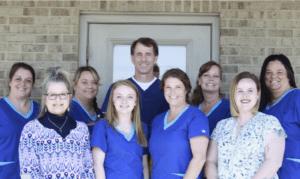Most adults whose jaw and gums are in good health — and whose overall general health is strong — are good candidates for dental implants. With modern advancements in holistic tooth replacement, even if your jaw needs a bit of help to take a dental implant properly, dental bone grafting can make most people viable candidates for dental implants.
There are, however, some people who may not be eligible to undergo the process of dental implant surgery. This includes especially people with chronic diseases and immunodeficiencies. Please consult with your trusted local oral surgeon to further discuss specifics.
At Wilmington Oral Surgery, our Cincinnati patients trust us to create the best tooth replacement plan possible for them. Dental implant surgery is by far the most desirable solution to replace missing teeth, because they replace the natural tooth and its root, and the implants integrate with your jaw, preserving its health. So, if it’s in our power, we’ll get you there.
Am I a Viable Candidate for Dental Implants?
Here are five reasons why a person may not be a good candidate for dental implants:
The person smokes cigarettes.
Dental implants are generally fine for former smokers. However, if the candidate is continuing to smoke cigarettes on a daily basis, this procedure may not be the right call. There are a few reasons for this. One is that the extraction process — if one is necessary — will create an open socket that could be infected by the tobacco smoke. Exposure of an unprotected area in the mouth to carcinogenic elements in the smoke could increase the patient’s risk for mouth cancer.
Smoking also slows down the body’s healing processes and increases the risk of tissue necrosis at the site of the dental implant. In such cases, it is advised to quit cigarettes completely before considering dental implant surgery. You then also must consider that during the healing periods of the dental implant process you will also not be allowed to smoke.
And really, it’s a good idea to quit smoking anyways!
The person has diabetes that is not controlled by medication or injections.
If the person is on a treatment regimen for diabetes or pre-diabetes, and is working with a medical professional to keep their blood sugar in check and under control, then this is likely not an issue, and dental implants would be fine. If the diabetes is not treated, however, then there is cause to consider advising against dental implant surgery.
Unchecked diabetes causes unpredictable swings in glucose levels that can have harmful effects on your health in many ways. Some of these effects include compromised oral health. Diabetes affects the amount of saliva you produce as well as its sugar content. Unchecked glucose levels leave you at higher risk of gum disease and tooth decay, and these risks could impact dental implant surgery.
The person has had radiotherapy on the jaw or surrounding area.
In talking about radiotherapy, we are referring to the types of therapies often used for cancers of the mouth or jaw. The radiation and high-energy rays used to combat cancer cells can make the jaw more susceptible to fracture. Any time the jaw is compromised in that way, we take caution in what we can recommend in the world of oral surgery. Each case is unique, certainly, but if you have had radiation therapy within a few years on that part of your body, chances are high that we would recommend against implants.
Radiation therapy is a double-edged sword, as it kills cancerous cells (good) but also damages healthy cells (bad). After radiation therapy, your body may not have the resources for your jaw to take a dental implant. And if your jaw can’t fuse around the root of the dental implant, it can cause a series of complications that can lead to even further damage. In cases of illness-induced jaw deterioration, there may be alternative options for dental implant surgery, like the All-on-Four dentures, or mini implants.
The person has periodontal (gum) disease.
This may be surprising to hear. Periodontitis and other gum diseases can cause adults to lose teeth. Often, the solution to this problem involves getting dental implants and maybe some soft tissue grafting. But there may be complications that would prevent us from being able to install dental implants in the way we need to. Periodontitis that has progressed to the point of causing jaw damage and bite instability can render dental implants a non-viable option.
We offer free consultations with our oral surgeon for patients who are curious about getting dental implants installed to replace missing teeth. So if you have gum disease and want to pursue an implant option, we would be more than happy to meet with you, evaluate your situation, and advise you on the next steps.
The person is under 18.
Kids can also lose adult teeth. There are a multitude of reasons why a minor may lose teeth — accidents, falls, too many Mountain Dews, hockey games gone awry. But, alas, we cannot put in dental implants for someone under the age of 18. This is because the jaw is still growing at that age. The developing jaw may bond with the implant in the way it is intended, but the additional growth could cause the implant to shift and move out of alignment. Having an implanted tooth end up in the wrong position poses many problems.
In many cases, dental implant surgery will be available for the patient at some point, but until the age of 18 their solutions must be orthodontic approaches rather than implants. Orthodontists and oral surgeons alike can analyze oral x-rays and estimate the time at which the jaw will be finished developing. That will give you a good idea of when you can get dental implant surgery. Before that, you might be stuck with a removable dental bridge.
Compassionate Oral Surgery Care
Located in Wilmington, Ohio, Wilmington Oral Surgery is worth the drive from anywhere in the Cincinnati area. We specialize in patient-focused, holistic tooth replacement, mouth reconstruction, wisdom tooth extractions, and more. We offer the latest technology in dental bone grafting, and offer both titanium and zirconia ceramic dental implants. Our goal is that each of our patients leaves our care with beautiful and, most importantly, healthy smiles. Call our office at 937.382.8020, or use our contact form to set up an appointment. We look forward to hearing from you.








